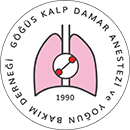

Determination of Mortality in Cardiac Surgery: Is Cardiac Surgery Scoring (CASUS) System Effective?
Senem Polat1, Nurgul Yurtseven21Department of Anesthesiology and Reanimation, Bahcesehir University, Istanbul, Turkey2Department of Anesthesiology and Reanimation, Dr. Siyami Ersek Thoracic Cardiovascular Surgery Training and Research Hospital, University of Healt Science, Istanbul, Turkey
Objective: This study was planned to evaluate effectiveness of cardiac surgery score (CASUS) system used for the prediction of mortality after the cardiac surgery and to compare it with EuroSCORE, a tested and approved method.
Method: Fifty patients over the age of 18 who came to the intensive care unit (ICU) after open heart surgery and stayed in the ICU for more than 48 hours were prospectively included in the study. After the preoperative EuroSCORE evaluation of the patients, CASUS scoring systems were used for risk scoring from postoperative 0 day to the service or up to the 6th postoperative day (or possible mortality) in patients whose stay in ICU was prolonged. We evaluated the place of both models in the prediction of ICU mortality.
Results: The study was conducted with 50 patients- 21 female, 29 male-, aged between 19 and 79 years (mean age: 60.38±12.50). Five (10%) cases exited.The areas under the ROC curve were estimated as follows: EuroSCORE, 45.3%; and for CASUS 0,1, and 2. day scores AUCs of ROC curve were 66,9%, 64,7%, and 79,8%, respectively. The CASUS 2nd day score was found to be valuable in predicting mortality (p<0.01). A statistically significant relationship was observed between the days of stay in the ICU and mortality.
Conclusion: Our results show that the rate of the accurate prediction of mortality of CASUS is insufficient on postop 0th and 1st day; however CASUS score on postoperative 2nd day has sufficient.predictive accuracy EuroSCORE is not found effective in the prediction of mortality. It is observed that if the duration of stay in ICU is prolonged, it statistically significantly increases the risk of mortality.
Keywords: Cardiac surgery, CASUS, EuroSCORE, Mortality
Kardiyak Cerrahide Mortalite Tayini: Kalp Cerrahi Skorlaması (CASUS) Sistemi Etkin mi?
Senem Polat1, Nurgul Yurtseven21Bahçeşehir Üniversitesi Tıp Fakültesi, Anestezi ve Reanimasyon Bilim Dalı, İstanbul2Sağlık Bilimleri Üniversitesi Dr. Si̇yami̇ Ersek Göğüs Kalp ve Damar Cerrahi̇si̇,Anestezi ve Reanimasyon Bilim Dalı, İstanbul
Amaç: Bu çalışma, kardiyak cerrahi sonrası gelişebilecek mortalite öngörüsünde kullanılan kardiyak cerrahi skorlaması (CASUS) sisteminin etkinliğini değerlendirmek ve geçerliliği test edilmiş bir yöntem olan EuroSCORE ile karşılaştırmak üzere planlandı.
Yöntem: Açık kalp cerrahisi sonrası yoğun bakım ünitesine (YBÜ) gelen ve YBÜde 48 saatten fazla süre kalan 18 yaşından büyük 50 hasta prospektif olarak çalışmaya alındı. Hastaların preoperatif EuroSCORE değerlendirmesi yapıldıktan sonra, postoperatif sıfırıncı günden servise alınmalarına veya yoğun bakım kalışı uzayan hastalarda postoperatif 6. güne kadar (veya olası mortalite durumuna) risk skorlaması için CASUS skorlama sistemleri kullanıldı. Her 2 modelin YBÜ mortalite tahminindeki yerini değerlendirildi.
Bulgular: Çalışma 21i kadın, 29u erkek, yaşları 19 ile 79 arasında değişen (ortalama 60,38±12,50) 50 hasta ile yapıldı. Olguların 5inde (%10) mortalite görüldü. ROC eğrisinde altta kalan alan EuroSCORE için %45,3; CASUS 0. gün %66,9; CASUS 1. gün %64,7; CASUS 2. gün için %79,8 olarak saptandı. CASUS 2. gün skorunun mortaliteyi göstermede değerli olduğu saptandı (p<0.01). Yoğun bakımda kalış günleri ile mortalite arasında istatistiksel olarak anlamlı ilişki görüldü.
Sonuç: Sonuçlarımız CASUSun mortaliteyi tahmin etme oranının postop. 0. ve 1. günde yetersiz kaldığı, ancak postop. 2. günde yeterli olduğunu göstermektedir. EuroSCORE ise mortaliteyi tahmin etmede etkin bulunmadı. YBÜde kalış süresinin uzamasının mortalite riskini istatistiksel olarak anlamlı derecede artırdığı gözlendi.
Anahtar Kelimeler: Kardiyak cerrahi, CASUS, EuroSCORE, Mortalite
Manuscript Language: Turkish
(1167 downloaded)

















